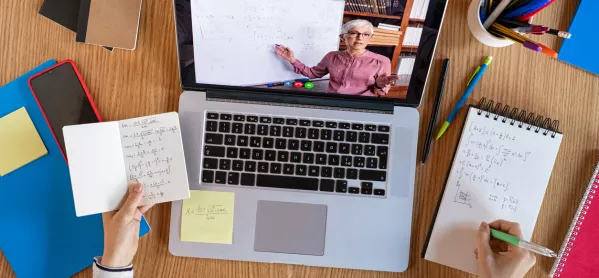Headteachers have said it is “vital” that the government’s free laptops scheme is “expanded rapidly” to include disadvantaged children in more year groups.
The Association of School and College Leaders (ASCL) also said that it hopes devices will “begin to arrive shortly”, as a spot check of members last night found that none had yet received their orders.
The Department for Education announced on 19 April that “disadvantaged” children in Year 10, together with care leavers and those with social workers, will be given free devices in a bid to make remote learning during lockdown easier.
Exclusive: Free laptops not guaranteed before schools reopen
Coronavirus: DfE won’t say who will get free laptops
Williamson: No free laptops until ‘end of May’
But ASCL believes it is important that disadvantaged children in other year groups also get access to the free technology.
The DfE has said it will fund 200,000 laptops for children from the most challenging backgrounds, but is not clear how many devices have been sent out so far.
When Tes asked the DfE how many free laptops, tablets and 4G routers had been delivered to date, it would not provide a figure.
The DfE previously said the first batch of free laptops and tablets for disadvantaged pupils would not be delivered until the end of May, and the majority would arrive in June.
Geoff Barton, ASCL general secretary, told Tes: “We also think it is vital that this scheme should be expanded rapidly to include disadvantaged children in other year groups.
Coronavirus: How many pupils will get free laptops?
“We haven’t collected data on how many laptops have been delivered under the government scheme, but we did a quick check with five members in different areas of the country last night, and none have yet received them.
“Our understanding is that the first batch of laptops would be arriving at the end of May, with the majority delivered through June, so hopefully they will begin to arrive shortly.
“We know that a number of schools and colleges have themselves endeavoured to source laptops for vulnerable and disadvantaged children who don’t have access to these devices, but this is not always possible.
“The government has now asked schools to provide some face-to-face contact for Year 10 pupils from June 15, but its expectation is that remote education will continue to be predominant, so the sooner these laptops arrive the better.”
At a meeting of the Commons Education Select committee today, schools minister Nick Gibb was asked about pupils without access to remote learning, who were not eligible for the DfE’s laptops scheme.
Committee chair Robert Halfon said: “Around one and a half million pupils are eligible for the pupil premium but are not covered by the laptops scheme.
“And 17 per cent of households in the lowest income quintile do not have access to the internet, and the children’s commissioner has suggested that 700,000 children don’t have either a laptop or a desktop at home.
“What are the plans for these individuals, who are not part of the existing scheme?”
Mr Gibb said: “We had to prioritise where the resource would go. And we prioritised children in care; those children who are known to a social worker; and who are in Year 10 and are taking exams next year.
“So that was clearly the priority. Schools, of course, have other computers that they are lending and using to make sure that they can deliver online lessons to their pupils - and those computers exist already.”
A DfE spokesperson said: “We will do everything possible to make sure no child, whatever their background, falls behind as a result of coronavirus.
“We have provided over £100 million to boost remote education, including providing devices to those children who need it most, and technical support for schools to access and effectively use Google and Microsoft’s education platforms.”




